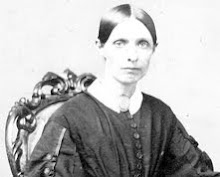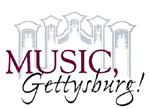
We often pass this way when doing our errands. I have always been curious about this memorial which is new-(it was dedicated this past summer of 2008.)
"A monument has been erected in Hunterstown",
as the following story in the York Daily Record/Sunday News (7/6/08) reports:
"Glen Churchill and Jane Churchill Webb never knew their grandfather, a Civil War soldier who died nearly 20 years before either of them was born.
They grew up with tales of Norvell Churchill as a talented horseman and an enthusiastic performer during Fourth of July events in Michigan, where much of the family still resides.
Their grandfather's storied service as a Union cavalryman in the Civil War was only part of those tales, the two said.
It's only been in the last few decades that Glen Churchill, now 85, said he has realized his grandfather's true significance to American history.
"I read it in history books," he said.
But now, for both historians and the Churchill family, Norvell Churchill's place in history will always be reserved as the man who saved Union Gen. George Custer from almost certain death on the Hunterstown battlefield northeast of Gettysburg on July 2, 1863.
As the story goes, 23-year-old Norvell Churchill rescued Custer -- also 23 at the time -- after his horse was shot out from under him and Confederate soldiers were closing in to attack. Churchill killed one of Custer's attackers and hoisted the general off the ground and onto his horse.
Now 85 and 82 respectively, Glen and Jane represent Norvell Churchill's closest living relatives. Their fathers were brothers, each the son of Norvell Churchill.
They were two of about 60 descendants who recently witnessed the unveiling of Gettysburg's newest Civil War monument, which describes both the significance of the Hunterstown battle and Norvell Churchill's role in saving Custer's life.
"I just wish our fathers were here," Jane Churchill Webb said.
The event marked the first time any monument has been erected in Hunterstown, also known as North Cavalry Field, to commemorate the battle between Custer's 1st Michigan Cavalry brigade -- famously known as the Wolverines -- and the larger numbers of a Confederate cavalry brigade commanded by Gen. Wade Hampton.
Historians say the battle between opposing cavalries was significant because it kept the attention of both units on the battlefield's northern end while crucial struggles were taking place to the south on Little Round Top and at the Peach Orchard.
The Hunterstown battle also marks the first time Custer made a name for himself as a gutsy commander. The Boy General led a seemingly suicidal charge of a few dozen men down Hunterstown Road against an enemy who was behind cover and outnumbered him.
Casualties on both sides, however, were relatively light.
Until recently, the battle was unknown to all but the Civil War's most ardent students. That began to change around 2002, when Roger and Laurie Harding purchased Hunterstown's Historic Tate Farm, a property where George Washington stopped on the way back from the Whiskey Rebellion in 1794.
The Hardings established a historic preservation group, The Friends of Hunterstown, when two buildings on Route 394 that dated back to the 1800s were at risk of being torn down and replaced with apartment buildings.
Preserving and promoting Hunterstown has been a goal of the couple ever since.
The event symbolized the accomplishment of another objective: to erect a permanent monument dedicated specifically to the battle at Hunterstown. After the monument's unveiling, the fourth annual walking tour of the battlefield was offered to visitors.
"It's a very moving day for us," Laurie Harding told the dozens who attended the unveiling, held on the battle's 145th anniversary.
That significance of both the battle and of the event was not lost on at least some members of Norvell Churchill's family.
"I think Norvell is looking down now, in disbelief maybe," said Pat Stephens, a great-granddaughter.
Though Norvell Churchill's connection to the famous Boy General was never the focus of his family's tales, Glen Churchill said he now knows that his grandfather played an even greater role in history.
"I think it's wonderful that he saved (Custer's) life," he said. "This battle started the end of the war."
For more information on this monument and Hunterstown, visit http://www.hunterstown1863.com/id31.html


















No comments:
Post a Comment